#nuclear child
Text
I have doodled a baby

70 notes
·
View notes
Text


are we still doing this because i have a late submission
#🐉#this is less about fan content and more about that awful lazy one size fits all#'10 years later theyre happily married with a cute little nuclear family' trope#because ive read some genuinely incredible fics about characters who would Not fucking have kids#ending up with accidental pregnancy scares or child acquisitions that get treated with all the nuance#and thoughtful handling they deserve#but also. i reread one of my favourite fics yesterday and when one character jokingly brought up the idea of children#and the other reacted with genuine visceral disgust and said what hideously awful parents theyd be#i lit up like a fucking christmas tree
29K notes
·
View notes
Text
Why we don’t like it when children hit us back
To all the children who have ever been told to “respect” someone that hated them.
March 21, 2023
Even those of us that are disturbed by the thought of how widespread corporal punishment still is in all ranks of society are uncomfortable at the idea of a child defending themself using violence against their oppressors and abusers. A child who hits back proves that the adults “were right all along,” that their violence was justified. Even as they would cheer an adult victim for defending themself fiercely.
Even those “child rights advocates” imagine the right child victim as one who takes it without ever stopping to love “its” owners. Tear-stained and afraid, the child is too innocent to be hit in a guilt-free manner. No one likes to imagine the Brat as Victim—the child who does, according to adultist logic, deserve being hit, because they follow their desires, because they walk the world with their head high, because they talk back, because they are loud, because they are unapologetically here, and resistant to being cast in the role of guest of a world that is just not made for them.
If we are against corporal punishment, the brat is our gotcha, the proof that it is actually not that much of an injustice. The brat unsettles us, so much that the “bad seed” is a stock character in horror, a genre that is much permeated by the adult gaze (defined as “the way children are viewed, represented and portrayed by adults; and finally society’s conception of children and the way this is perpetuated within institutions, and inherent in all interactions with children”), where the adult fear for the subversion of the structures that keep children under control is very much represented.
It might be very well true that the Brat has something unnatural and sinister about them in this world, as they are at constant war with everything that has ever been created, since everything that has been created has been built with the purpose of subjugating them. This is why it feels unnatural to watch a child hitting back instead of cowering. We feel like it’s not right. We feel like history is staring back at us, and all the horror we felt at any rebel and wayward child who has ever lived, we are feeling right now for that reject of the construct of “childhood innocence.” The child who hits back is at such clash with our construction of childhood because we defined violence in all of its forms as the province of the adult, especially the adult in authority.
The adult has an explicit sanction by the state to do violence to the child, while the child has both a social and legal prohibition to even think of defending themself with their fists. Legislation such as “parent-child tort immunity” makes this clear. The adult’s designed place is as the one who hits, and has a right and even an encouragement to do so, the one who acts, as the person. The child’s designed place is as the one who gets hit, and has an obligation to accept that, as the one who suffers acts, as the object. When a child forcibly breaks out of their place, they are reversing the supposed “natural order” in a radical way.
This is why, for the youth liberationist, there should be nothing more beautiful to witness that the child who snaps. We have an unique horror for parricide, and a terrible indifference at the 450 children murdered every year by their parents in just the USA, without even mentioning all the indirect suicides caused by parental abuse. As a Psychology Today article about so-called “parricide” puts it:
Unlike adults who kill their parents, teenagers become parricide offenders when conditions in the home are intolerable but their alternatives are limited. Unlike adults, kids cannot simply leave. The law has made it a crime for young people to run away. Juveniles who commit parricide usually do consider running away, but many do not know any place where they can seek refuge. Those who do run are generally picked up and returned home, or go back on their own: Surviving on the streets is hardly a realistic alternative for youths with meager financial resources, limited education, and few skills.
By far, the severely abused child is the most frequently encountered type of offender. According to Paul Mones, a Los Angeles attorney who specializes in defending adolescent parricide offenders, more than 90 percent have been abused by their parents. In-depth portraits of such youths have frequently shown that they killed because they could no longer tolerate conditions at home. These children were psychologically abused by one or both parents and often suffered physical, sexual, and verbal abuse as well—and witnessed it given to others in the household. They did not typically have histories of severe mental illness or of serious and extensive delinquent behavior. They were not criminally sophisticated. For them, the killings represented an act of desperation—the only way out of a family situation they could no longer endure.
- Heide, Why Kids Kill Parents, 1992.
Despite these being the most frequent conditions of “parricide,” it still brings unique disgust to think about it for most people. The sympathy extended to murdering parents is never extended even to the most desperate child, who chose to kill to not be killed. They chose to stop enduring silently, and that was their greatest crime; that is the crime of the child who hits back. Hell, children aren’t even supposed to talk back. They are not supposed to be anything but grateful for the miserable pieces of space that adults carve out in a world hostile to children for them to live following adult rules. It isn’t rare for children to notice the adult monopoly on violence and force when they interact with figures like teachers, and the way they use words like “respect.” In fact, this social dynamic has been noticed quite often:
Sometimes people use “respect” to mean “treating someone like a person” and sometimes they use “respect” to mean “treating someone like an authority” and sometimes people who are used to being treated like an authority say “if you won’t respect me I won’t respect you” and they mean “if you won’t treat me like an authority I won’t treat you like a person” and they think they’re being fair but they aren’t, and it’s not okay.
(https://soycrates.tumblr.com/post/115633137923/stimmyabby-sometimes-people-use-respect-to-mean)
But it has received almost no condemnation in the public eye. No voices have raised to contrast the adult monopoly on violence towards child bodies and child minds. No voices have raised to praise the child who hits back. Because they do deserve praise. Because the child who sets their foot down and says this belongs to me, even when it’s something like their own body that they are claiming, is committing one of the most serious crimes against adult society, who wants them dispossessed.
Sources:
“The Adult Gaze: a tool of control and oppression,”
https://livingwithoutschool.com/2021/07/29/the-adult-gaze-a-tool-of-control-and-oppression
“Filicide,” https://en.wikipedia.org/wiki/Filicide
#repost of someone else’s content#medium repost#Alba M.#purity culture#ageism#adultism#youth oppression#childism#child abuse#parental abuse#youth rights#youthlib#youth liberation#parricide#nuclear family abolition#anarchism#note: I would consider reevaluating the demonization of adults who kill their parents too#many victims remain entrapped well into adulthood#there are still a lot of issues of economic dependency and control especially for young adults#and I don’t think such a totalizing power imbalance engendered in childhood is so easily levelled#even if an adult does become financially independent#likewise for adult victims of intimate partner abuse: also structurally made difficult for them to leave#even if not criminalized to the same degree#anti-abuser aktion
2K notes
·
View notes
Text
my favorite thing about the "iskall is tubbo's dad" bit is that, as best i can tell, this is the one case of family dynamics having absolutely nothing to do with the fandom. iskall and captain sparklez and tubbo were just hanging out and they declared themselves as tubbo's dad as a joke and iskall specifically is the one who hasn't let it go. every time he catches sight of tubbo he goes "MY SON :D". tubbo shows up randomly in his singleplayer vault hunters and he's like "my beloved son". tubbo says something on twitter and iskall goes "my kid". and he's like. the ONE GUY pushing this. i have seen surprisingly little fandom content of this one. i think tubbo just nods and goes along with it. iskall though? iskall has adoption papers signed on his wall. i'm not sure tubbo even signed them. iskall may have forged that. everyone's just going with it. it's really funny to me,
#iskall85#tubbo#I'M NOT NORMALLY INTO FAMILY DYNAMIC STUFF because i think it often reduces one cc to their relationship with another guy#and also often sort of shoves people into a weird nuclear family#however. objectively funny that iskall seemingly took one look at tubbo and went 'my child now'#and is now ABSOLUTELY REFUSING to let go
2K notes
·
View notes
Text
all im saying is ive never seen someone criticize those marylily or dorlily fanart/fics where they’re harrys mothers and theres no james in sight
#yall will force lily to be a mother bc of ’canon’ but yall dont care about james //responsibility// being a father ??#yall are not the feminists you think you are#the absolute stupidest reason to be against jegulus fr#’how can you take harry from lily?’ ok and what about all the wlw lily ships where they raise harry ?#where are you THEN ??? asking how they can take harry from james ????? WHERE ARE YOU THEN#a woman will always be nothing but a mother#even before she even is one#*lia voice* ever since she’s been a daughter she’s been a prisoner#why is harry ONLY lilys goddamn responsibility#free lily from being a young mother fr..#a dad is a babysitter and a mother has to lay down her life and freedom for the child#which is why yall dont actually care#you just want to be anti jegulus and loud about it#i dont even ship jegulus#ahfhsjsj#maybe reevaluate your stance on the heteronormative nuclear family dynamics and how they’re anti women#bc yall are just pushing the heteronormative agenda with this absolutely lacking take#ok anyway#interesting hill to die on from a girl who hates mlm ships having kids and doesnt ship jegulus#but thats a whole other thing#so!
296 notes
·
View notes
Text
you all need to stop forcing the newsies into nuclear family dynamics please im begging you
#'what if x was the mom friend' stoooOOOOOOOP-#it HUUUUUUUUURTS...#1) none of them should be the mom/dad/whatever friend because they are CHILDREN.#the whole point of santa fe is that jack (a child) cannot bear the responsibility of everyone counting on him (A CHILD) to save the day#davey (A! CHILD!) is put under ungodly amounts of stress having to be the provider of his family at age 16 (yknow! A C H I L D!!)#2) why do they even need these nuclear family dynamics?? for a fandom that adores queerness yall are getting way too straight in here#the newsies do not NEED a set mother figure or a set father figure. they just need a stable family.#and like. surprise! a stable family can look like anything!#newsies
158 notes
·
View notes
Text
The funny thing about Vox and Val being Velvette's dads is that it also (partially) comes from the old Instagram accounts (Vel would sometimes say things like "My parents are fighting again :(" when the other two were going through another breakup), except even there it was glaringly obvious that Velvette was an adult and just acted childish and cutesy on purpose to fuck with people. And it made Vox sooo mad he was like "Stop saying shit like that you're a grown ass woman" and Val would play along (but it didn't stop him from talking shit about her)
#.ramblings#vox#valentino#hazbin hotel#velvette#hazbin hotel velvette#hazbin hotel vox#hazbin hotel valentino#the vees#also ik the fandom likes to infantilize female characters and vel being short doesn't help#but here it's more the problem of trying to slot found family into nuclear family roles#I've seen a bunch of examples of when there's a trio of friends and the two of them start dating the third one starts getting treated#by the fandom as their child. and it happens to a lot of different combinations of genders#mentioned staticmoth
59 notes
·
View notes
Text
[epistemic status: a bunch of semi-related thoughts I am trying to work out aloud] It has been noted countless times that reactionary politics rely on a feeling of threat: our enemies are strong and we are weak (but we are virtuous and they are not, which is why they’re our enemies!); we must defend ourselves, we must not be afraid of doing what needs to be done; we must not shie away from power generally, and violence specifically.
And there are lots of contexts--like when talking about the appeal of reactionary politics in the US before and at the beginning of Trump’s rise to prominence, or when talking about hard-on-crime policies that are a springboard to police militarization, or (the central example of all this in the 21st century) the post 9/11 PATRIOT-act terrorism paranoia that was a boon to authoritarians everywhere, and spurred a massive expansion of both control and surveillance in everyday life--where critics of reactionary rhetoric are chastised for their failure to appeal to the other side, because they come off as callous towards their concerns and their real fears and anxieties.
And while this might not be strategically correct, frankly, I think there’s a sense in which it is justified to be callous towards those concerns. Because those concerns are lies. They may be lies borne out of a seed of real experience (9/11 did happen, of course), but the way that seed is cultivated by focused paranoia, by contempt toward cultivating any sense of proportionality or any honest comparison of risk, the way it is dragooned into the service of completely orthogonal political goals (”the CIA/NSA/FBI must be able to monitor all private communications everywhere in the world, just in case it might prevent another 9/11″) chokes off any possible sympathy I might otherwise feel. American paranoia about another couple thousand lives being lost in a 9/11 like event resulted in a number of deaths literally multiple orders of magnitude larger in Iraq and Afghanistan. During the former, some years Iraq was suffering the equivalent of six or seven 9/11s a year.
So, any fear-driven policy must not (for example) say “to prevent disaster X happening again, we’re going to make it happen 270 times over to someone else.” That’s not reasonable. And “fear is a bad basis for crafting policy” is not exactly a revolutionary observation. There’s that probably-apocryphal story of a Chinese professor responding to Blackstone’s Ratio--you know, “better that ten guilty persons go free than one innocent person suffer”--with “better for whom?” Which is supposed to be this trenchant and penetrating question that makes you reexamine your assumptions. But it’s always struck me as idiotic. Better for society! For everyone! Because the law only functions well if it is seen as a source of order and justice, not as an authoritarian cudgel; because a society in which anxiety drives policymaking and legal responses to social ills is one that is in the process of actively devouring itself; because flooding the public discourse with language that dehumanizes criminals and makes it easy to separate the individual from universal principles like civil rights is an acid that destroys the social fabric.
Fear as a germ of reactionary politics manifests itself in lots of ways outside of both historical examples, like fascism, or more recent examples, like US foreign policy during the war on terror. Fear and its link to purity-attitudes, with a low level of scientific literacy in general, drives stuff like the organized anti-vaccine movement. In the Hertzsprung-Russel diagram of political tendencies, I’d argue it’s a big factor in the wellness-to-Qanon track. It’s a big part of tough-on-crime rhetoric, which in the American instance in particular also draws on an especially racialized form (cf. the “Willie Horton” ad). Fear and purity and anti-contamination anxieties are even big in opposition to nuclear power, because most of the public just has a really bad sense of what the comparative dangers of nuclear vs fossil fuel are; and because the former has been culturally salient since 1945 in a way the latter hasn’t, nuclear contamination feels much more threatening than fossil fuel waste, despite by any measurable harm the latter causing far worse problems, even before you factor in any risks from climate change.
I would like to argue in particular that true crime as an entertainment genre, and wellness culture, and fears about child abuse all contribute to reactionary politics--they are in themselves major reactionary political currents--in a way that cuts across the political spectrum because they are not strongly marked for political factionalism. A lot of the rhetoric both from and around true crime entertainment promotes the idea that violent crime exists, or at least can flourish, because of an insufficiently punitive attitude toward crime; one that can only be fixed by centering victims’ desire (or putative desire) for retribution in the legal process, by eroding the civil rights of the accused, and by giving the police and prosecutors more power. Obviously, this is just 80s and 90s tough on crime rhetoric repackaged for millennials; it centers individual experience a bit more and deemphasizes the racial component that made the “Willie Horton” ad so successful, but it posits that there is only one cause for crime, a spontaneous choice by criminals that has no causal relationship with the rest of the world, and only one solution, which is authoritarianism.
Wellness culture leverages purity concerns and scientific illiteracy in ways which are so grifty and so transparently stupid that it’s by far the least interesting thing on this list to me; its most direct harm is in giving an environment for the anti-vaccine movement to flourish, and I’m always incredibly annoyed when people talk about how the medical establishment needs to do more to reassure the public about vaccines’ safety and efficacy. Again, strategically, this may be correct; people dying of preventable disease is really bad. But doctors as a body didn’t promote Andrew Wakefield’s nonsense; doctors as a body didn’t run breathless article after breathless article about vaccines maybe causing autism; doctors as a body didn’t scare the bejezus out of folks in the 90s and then act all surprised when preventable childhood diseases started breaking out all over the place.
Although outside the whole anti-vax thing, I think there are lots of other harms that wellness culture creates. It tends to be fairly antiscientific; in order to sell people nonsense (because as a subculture it exists almost exclusively to sell people things) it has to discredit anything that might point out that it is selling nonsense. Whether the anti-intellectualism that flourishes in these quarters is a result of intentional deceit or just a kind of natural rhetorical evolution probably varies. But it is an important component of wellness culture to be able to play a shell game between “big pharma doesn’t have your best interests at heart,” “you don’t need your anti-depressants,” and “laetrile cures cancer.”
The way in which fears of child abuse are turned into a reactionary political cudgel probably actually annoys me the most; whether it’s Wayfair conspiracy theories, conservatives trying to turn “groomer” into an anti-queer slur, or just antis on tumblr, the portrayal of sadistic sexual threat aimed at children from an outside malevolent force is compelling only because the vast majority of child abuse and CSA comes from within families and within culturally privileged structures of authority like churches, and this fact makes everyone really uncomfortable, and no one wants to talk about it. I remember getting really annoyed during the Obama years when the White House wanted to talk about bullying and anti-LGBT bullying in particular, while studiously avoiding blaming parents and teachers in any way for it, despite the fact that all the coming out horror stories I know are from people’s parents turning on them.
Now, very conservative politics have always opposed dilution of a kind of privilege for the family structure; they envision a family structure which is patriarchal, and so dilution of this privilege is dilution of the status of patriarch. Very insular communities which cannot survive their members having many options or alternative viewpoints available to them, including controlling religions but also just abusive parents who want to retain control over their kids, also bristle at the idea of any kind of general society-wide capacity for people to notice how parents treat their children. But beyond that, I think our society still treats parents as having a right of possession over their children and their children’s identities, especially when they’re young, and bolsters that idea with an idea that the purity of children is constantly under threat from the outside world, and it is the parents’ job to safeguard that purity. The result is the nuclear family as a kind of sacred structure which the rest of society has no right to observe or pry open; and this is a massive engine of enabling the abuse of children. To no other relationship in our society do we apply this idea, that it should be free from “interference” (read: basic accountability) from the rest of society.
Moreover, the idea of childhood as a time of purity and innocence, which not only must be protected from but during which children must be actively lied to about major aspects of how the world works, is one of the last ways remaining to an increasingly secular culture to justify censorious and puritanical Victorian morality. It is hard to advocate for censorship to protect the Morals of the Christian Public, when nobody believes in the Morals of the Christian Public anymore; but “think of the children!” still works as a rallying cry, because of this nagging sense we have that age-appropriate conversations with children about adult topics will cause them to melt or explode.
In many ways, these anxieties on behalf of theoretical children are the ones I am most contemptuous of. Not because child abuse isn’t a serious problem--it is--but because the vector imagined for it is almost entirely opposite the one it actually tends to occur along. People who pretend that the primary danger to children is from strangers are usually woefully misinformed; people who pretend it is from media are either idiots or liars seeking a cover for their craving for censorship.
In conclusion: while it’s not possible to exorcise all our neuroses from our politics, anymore than we will ever exercise all our neuroses from our aesthetics, there are some we should be especially on guard against. A sense of threat, and anxieties which tie into concerns about purity and fears of contamination, are two big ones. These produce policies that are not only badly correlated with the outcomes they ostensibly want, but actually and severely destructive to them, in the same way that invading Iraq was actively destructive to any notion of preventing terrorism, saving American or Iraqi lives, or promoting political stability in the Middle East. And we should hold in healthy suspicion anybody whose politics seem to be driven by similar neuroses. Some merely believe very harmful things. Some are actually actively deceptive. None will achieve any of the higher aims they claim as justification for their beliefs.
#i'm not saying we *must* radically reshape society to destroy the nuclear family#but i am saying i think it would be good for child welfare
442 notes
·
View notes
Text


lines that make me feel shrimp emotions when presented in tandem
#makes me crazy!!! insane!!!#‘she froze’ vs ‘they held each other’ is crazy w/ her being likened to a child BOTH TIMES….#this lyctor nuclear family deconstruction shit is serious#mercymorn the first#aust.txt#tlt
37 notes
·
View notes
Text
im back for my monthly delusion and its alice this time BECAUSE WHY DOES NO ONE ELSE TALK ABOUT HER. OR RHINEDOTTIR. extremely powerful witches who are probably on equal power level to an archon just vibing and committing war crimes.
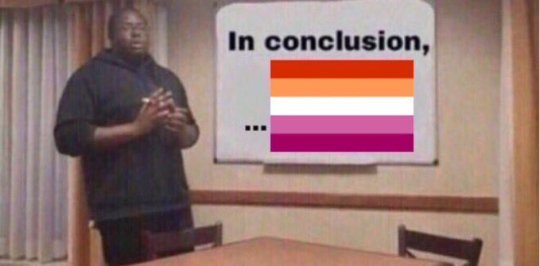
#self aware genshin impact#self aware genshin#genshin sagau#genshin impact sagau#sagau#alice#rhinedottir#im so normal abt them btw!!!!#i love both platonic alice + romantic alice bc i have mommy issues but also im a lesbian#i just think the unhinged absolutely batshit adventurer who blew up stormterror's lair bc she felt like it is. pretty :)#also she collects kids like pokemon cards shes perfect for sagau. yoink!! new child. oh your literally g-d??? anyway. baby :)#be nice to klee > alice adopts you bc you were nice to klee > ??? > profit#what r the archons gonna do??? fight alice?? she blew up mond bro she will not spare your nations!!!!#g-d forbid rhine get in on it too now you got two morally bankrupt scientists ready to invent nuclear weapons 2 beat you up!!!!#(we r ignoring that rhine will treat you like a glorified lab rat bc shes Curious bc g-d forbid women have hobbies smh /j)#alice holding reader like a wet kitten she just found in the dumpster: her rhined-#rhinedottir: no#welcome 2 the most fucked up family on teyvat!! we have two absent moms who do morally dubious experimentation!!!!!#we support morally fucked up women in stem in this household#okay gn i will actually shut up now zzzzzzzzzz#(i am ignoring that it is 2pm. n e way.)
152 notes
·
View notes
Text
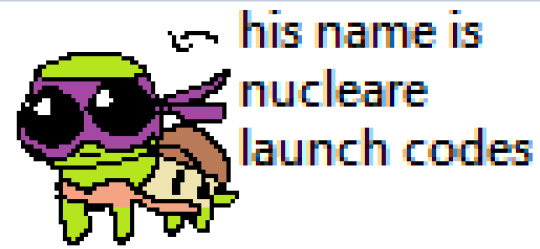
sleep deprivation
#their transgender looks and autistic gaze have enamoured me#that's my child. nuclear launch codes#sleep is for the weak. drawing donatello ninja turtle is not weak#tmnt donnie#2012 donnie#my favoutir fuckin lesbian#well maybe 2nd. raph better#tmnt#tmnt 2012#shitpost#i'm so tired but i refuse to eep
35 notes
·
View notes
Text
Hot take:
The obsession some people have with the Jedi only taking on one apprentice at a time and wanting them to change their ways (that have worked without issue for thousands of years) to take on multiple apprentices at a time is yet another way people try to force the Jedi into the western nuclear family unit
#wooloo-writes#wooloo writes#star wars#sw#jedi#pro jedi#in defense of the jedi#jedi padawan#a jedi master and padawan is a mentor-student relationship#it's not meant to be a nuclear family structure#a master and padawan can be parent-child#but it can also be a sibling relationship#a aunt/uncle-niece/nephew relationship#a friendship#but it is first and foremost a student teacher relationship
119 notes
·
View notes
Text
Maybe it's just because I'm sleepy and my brain is tired and irritable, but I do wish fandom in general weren't so absolutely intent on casting all familial or quasi-familial relationships into some near approximation of US nuclear family idealization.
Acting as a caretaker for a child doesn't automatically make someone their "real parent" or "adopted parent" or "any parent at all" if the child doesn't see them that way. These caretaking relationships can be messy, begrudging, or essentially coercive (in both fiction and IRL, and in life, forcing children into situations where "they'll be taken care of" is often coercive and/or predatory).
And sometimes a caretaker adult, whether a natural parent, adoptive parent, some kind of guardian, or more amorphous caretaker, is ... bad, actually. It's understandable for the children they take care of (whether literal children or now-adult people who experienced it previously) to have had negative experiences they have complicated feelings about, to have complicated feelings about their caretakers that may not distill down to "real parents", to be capable of harsh criticism of their former caretakers, even if they love them.
Sometimes it is the simpler scenario where a child is adopted and it looks very much like a conventional "nuclear" relationship (though even then, the child can have more complex and inconvenient feelings than they're often supposed to have). But—okay, I may be biased from coming from a family that was licensed for foster care, which saw a lot of children essentially forced into foster care with varying complicated feelings about it that didn't always equate to "this person who looks after me is my mother"—even after a long time, sometimes.
And there's frequently a nasty pressure on children placed in "care" to either reach out to their birth or adoptive parents, or to wholly turn their backs on them and accept their current caretakers as the only parents who matter. But usually things are messier than that. You can care about a caretaker, you can respect and love them, and still not feel like you're their child. Or maybe you do! It just depends.
This can happen with siblings as well, especially when there's a big age difference—yeah, one of the siblings may be functionally filling the shoes of their parents as well as they can, but it doesn't necessarily make them actual parents in the eyes of their younger siblings (or themselves). It can, but doesn't have to. Or maybe it's something messier, like when the relationship is almost parental, but not quite, and the exact nature of the dynamic is hard to pin down.
There's also the case where the relationship may have been parental at one point, but one of the parties (usually the caretaker) burned bridges so badly that the child (often an adult at this point) cuts ties and doesn't deny that the caretaker filled a parental role back then, but wholly rejects it as any kind of current reality. This can happen with biological family, but also with looser caretaker relationships as well (esp the cultier ones).
I'm thinking of a lot of fandom examples of these kinds of indeterminate caretaker-child (or former child) relationships, where either we know or have good reason to believe the child doesn't regard a former caretaker as exactly the same as a parent, or we just don't know what the nature of the relationship is, and fandom will be absolutely insistent that the only possible way to read it is parent-child.
And also, sometimes there's nothing wrong with the caretaker relationship, but it's still not parent-child. It simply doesn't map onto this parental mold that fandom tries to box all adult-child caretaking relationships into, because family is more complicated than a single, very simplistic model allows.
#i know i've grumped about this before—both the trend and specific instances of it#but it never goes away so my annoyance is evergreen#i've always thought it interesting that austen persistently characterizes georgiana's perception of darcy as /almost/ a father#they're close in this caretaker-child way that could be parental but isn't /quite/#i also think that elrond loving aragorn as much as he loves elladan and elrohir is incredibly touching#but also that fandom tends to overlook gilraen's influence and how her being as much elrond's niece as arathorn was his nephew#may have played into the family dynamic at rivendell#i also wish there was more fic exploring the difference between how leia feels as an adopted daughter and luke as a loved nephew#because luke so emphatically identifies with anakin and considers padmé their 'real mother' and says he can't remember his#like ... it's very clear that he's not thinking of beru as his mother even though he loved her#but bail and breha are totally leia's parents!#it's okay for things to be complicated and messy in ways that a strict nuclear family structure doesn't account for#anghraine rants#general fanwank#long post#for the tags:#austen blogging#austen fanwank#legendarium blogging#legendarium fanwank#sw fanwank
238 notes
·
View notes
Text
Would you guys get mad if I said that this is the same genre of character just different flavours


#when your the glasses wearing nonmagical child of a renowned magical family you have 2 options:#save the miracle or invent nuclear warfare#baatar jr#baatar#mirabel madrigal#legend of korra#tlok#avatar#the legend of korra#avatar the legend of korra#atlok
25 notes
·
View notes
Text
*death grips my chair* every time something lupin zero related gets leaked my expectations just get higher. dangerous. anyway based lupin ii design, looks exactly like that one completely insane jailbreak chapter in the manga, 10/10
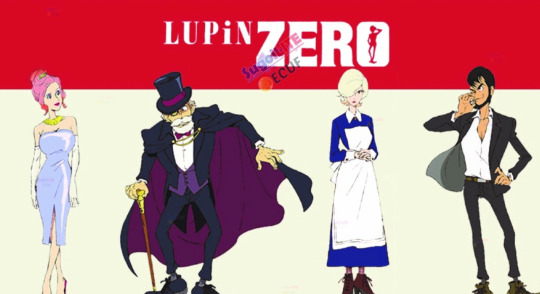
#also.... on god they better adapt that insane child organ stealing plot i want it so bad#they will not though im pretty sure maurice leblancs estate would go nuclear#lupin zero#lupin iii
181 notes
·
View notes
Note
tbh: you should just take all of that first thread out of the oppenheimer post. it's a little bit of truth (a couple dozen families of hispanic homesteaders had their land seized via imminent domain and were unjustly compensated) coupled with a *lot* of b.s. or exaggeration (their livestock were SHOT, they were FORCED to work in berylium mines, white workers got protective gear but hispanic ones didn't, loyda martinez sued because of the beryliosis, etc. etc.)
Thank you for telling me. I only did a general check on whether the issue was real instead of whether each claim was true. My bad. I was only able to do a cursory Google search on those claims, which didn't turn up anything, but Google is also pretty unreliable now. I'm beginning to doubt whether Alisa is a good faith actor though, which is a shame because it sabotages the surfacing of the violence done to New Mexico's Hispanos. I disabled reblogs on the post until I could look into it in-depth.
In the meantime, here's a source for the population impact and infant mortality of people caught downwind of the Trinity test:
Here's one about an NYC vigil held for the New Mexico people affected by The Manhattan Project's nuclear tests.
“They’ll never reflect on the fact that New Mexicans gave their lives. They did the dirtiest of jobs. They invaded our lives and our lands and then they left,” Tina Cordova, a cancer survivor and founder of a group of New Mexico downwinders, said of the scientists and military officials who established a secret city in Los Alamos during the 1940s and tested their work at the Trinity Site some 200 miles (322 kilometers) away.
And by far the most blood-curdling thing I found:

Jesus Christ. There's a book called The Plutonium Files written about the experiments conducted for The Manhattan Project. From the Wikipedia article:
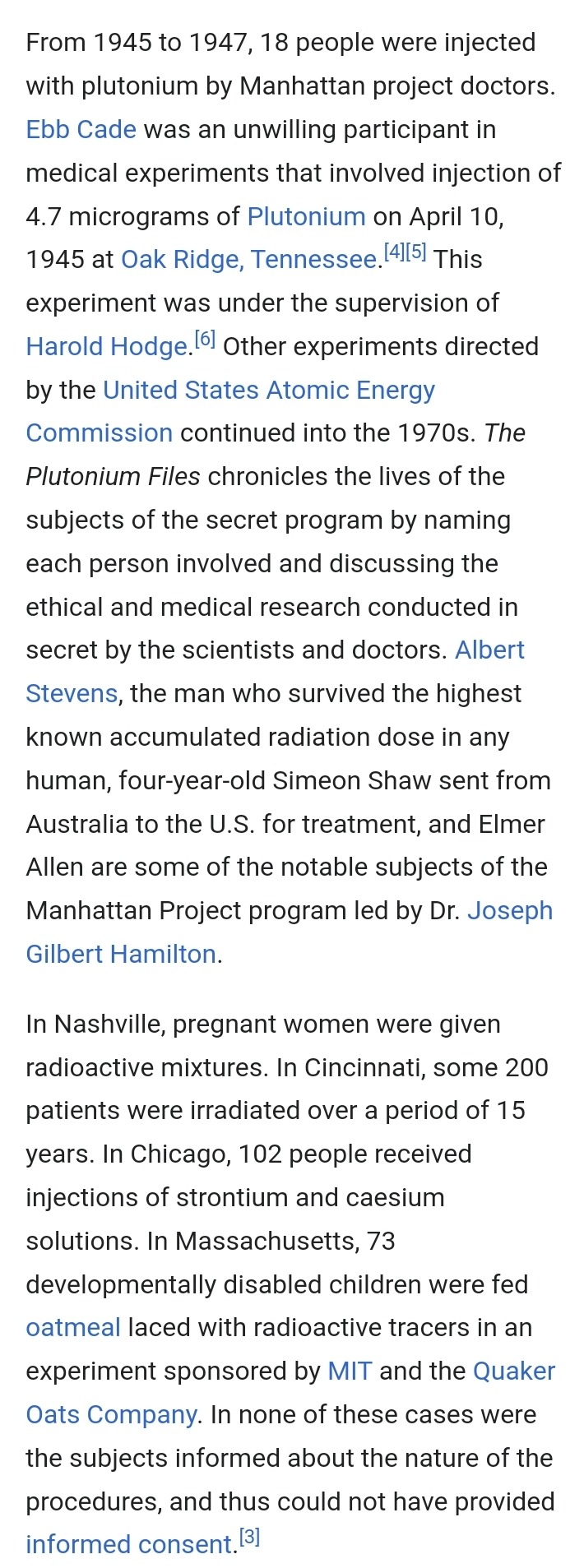
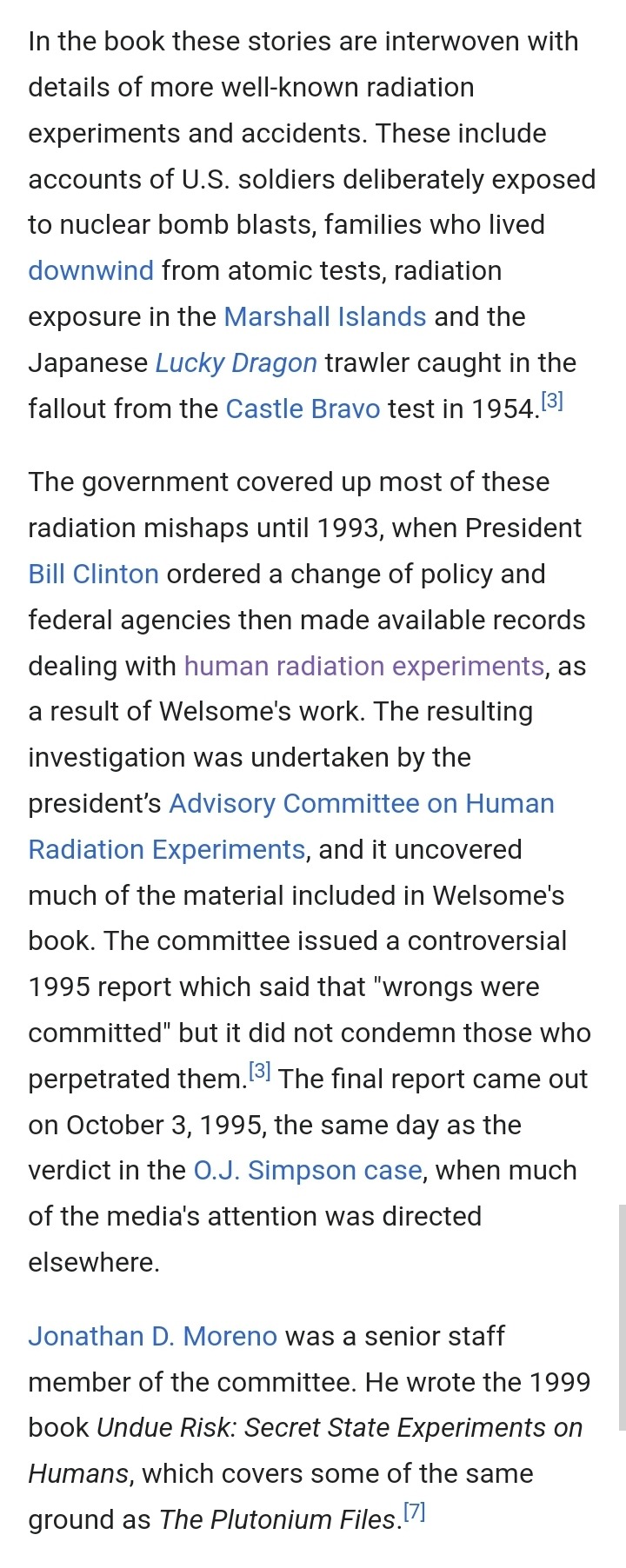
What. The fuck. I'd never be lax about unverified claims, but you can see why shooting livestock and the forced labour of native landholders doesn't stretch believability to a lot of people.
Here's a very detailed but easy to read pdf about the experiments and who spearheaded them. I'm ADHDing my way through it, but it does include Oppenheimer's own proximity to the trials.
#anon#asks#oppenheimer#new mexico#colonization#nuclear testing#the manhattan project#ableism#torture#world war ii#military industrial complex#war propaganda#human rights violations#disabled abuse#disabled history#cw: torture#cw: child abuse#the plutonium files#human experimentation#hispanos#indigenous rights#colonial violence#imperialism#knee of huss
48 notes
·
View notes